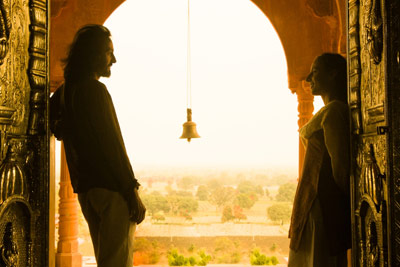Switch off and float into the vastness of Dhrupad
Musical duo, Samvad’s origins has all the whimsicality of a serendipitous meeting in the plot of a movie. In 2006, musicians Virginia and Igino bumped into each other at a local market.

Combining classical and modern: Ignio and Virginia
Both were carrying their instruments – the saxophone and the silver flute – and began playing together spontaneously.
Virginia and Igino hailed from a western classical music background but were at a crossroads in their musical lives and were keen to explore new ways of approaching music.
The encounter led to research in Indian classical music (an easy choice considering their connection to shared spiritual practices such as yoga and meditation) and the formation of Samvad.
The musical duo’s explorations delved into an intensive study of Dhrupad – one of the oldest surviving forms of Indian classical music which traces its origins to the chanting of Vedic hymns.
Originally from Italy, both now divide their time between Italy and India.Samvad has been travelling in Europe and U.S. and will be in Colombo for a series of performances and workshops. Below are excerpts of an interview.
- Samvad crafts new sounds out of ancient music and also uses western instruments to play Dhrupad – what differentiates the music you play from fusion music?
Today the word ‘fusion’ is widely used to describe different kinds of collaborations, and is therefore a confusing – if even a very appealing – word. We usually don’t like to use this word for our music as our musical research lies in a totally traditional way.
We have been learning with the Gundecha Brothers in the guru-shishya-parampara style, which basically means the oral passing of knowledge from a Guru to his students. Even if we use our western instruments, we still stick to the traditional schemes of Raag and Taal.
- Do tell us about Dhrupad. What was it which attracted both of you to it and what has been the most rewarding aspect of learning this art over the years?
Dhrupad is the most ancient style of north Indian classical music. What attracted us to it is mostly the deep dedication to sound and tuning and its way of unfolding the raga. In a way it is also the music which is most near to a spiritual approach – it is a sadhana, a naada yoga.
- What can people in Sri Lanka expect from your performance and workshops?
It is hard to say! We rather prefer the audience not to expect anything and just sit back, relax and switch off their thoughts rather than to think of something in specific. This music is very meditative and soothing.
| Workshops for children and adults Samvad will be conducting a flute workshop from December 17-19, at the Charcoal Gallery – Hotel Road, Mount Lavinia. Bamboo flutes will be brought down from India and will be available for practice or for purchase. The three-day children’s workshops (6 years and above) will be conducted from 10 a.m. to 1 p.m. while adult workshops will be conducted from 3 – 6 p.m. on the same dates. To register or for information about payments, please call 0774001117. Samvad will perform on December 16 at Santore Bistro – Sri Lanka Tennis Association, Colombo 7, at 8 p.m. (tickets priced at Rs. 1,000) and on December 19 – at Charcoal Gallery Cafe rooftop (tickets priced at Rs. 800). The duo will also perform on January 6, 2016 at Prana lounge – 60, Horton Place, Colombo 7 at 8 p.m. (tickets priced at Rs. 1,000). |


